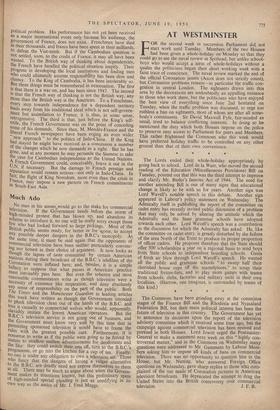AT WESTMINSTER
FOR the second week in succession Parliament did, not start work until Tuesday. Members of the two Houses had been given a whole-holiday on Monday so that they could go to see the naval review at Spithead, but unlike school- boys who would accept a term of whole-holidays without a qualm the politicians began their short working week with a faint trace of conscience. The naval review marked the end of the official Coronation jaunts (Ascot does not strictly count), but Coronation problems remain—in particular the traffic con- gestion in central London. The sightseers drawn into this area by the decorations are undoubtedly an appalling nuisance to those who work there, but the politicians who have enjoyed the best view of everything since June 2nd hesitated on Tuesday, when the traffic problem was discussed, to urge too ruthless a ban on sightseers, most of whom are after all some- body's constituents. Sir David Maxwell Fyfe, fair-minded as usual, tried to balance conflicting interests. In doing so he mentioned the duty which both Houses impose on the police to preserve easy access to Parliament for peers and Members. This rather frightened the Commons who this week would have preferred holiday traffic to be controlled on any other ground than that of their own convenience.
The Lords ended their whole-holiday appropriately by going back to school. Lord de la Warr, who moved the second reading of the Education (Miscellaneous Provisions) Bill on Tuesday, pointed out that this was the third attempt to improve and clarify Mr. Butler's famous Act of 1944. The need for another amending Bill is one of many signs that educational change is likely to be with us for years. Another sign was Lord Wavell's notable speech in this debate. Another sign appeared in Labour's policy statement on Wednesday. The Admiralty itself in publishing the report of the committee on cadet entry has recently invited public discussion of a problem that may only, be solved by altering the attitude which the Admiralty and the State grammar schools have adopted towards each other. Lord Wavell's speech was a contribution to the discussion for which the Admiralty has asked. He, like the committee on cadet entry, is greatly disturbed by the failure of the area North of the Trent to produce its proper proportion of officer cadets. He proposes therefore that the State should offer 500 scholarships a year on a regional basis to send boys from State schools to independent boarding schools. Gusts of fresh air blew through Lord Wavell's speech. He wanted all the public and grammar schools " to sweep half their cherished house cups off the mantelpieces," to scrap their traditional fixture-lists, and to play more games with teams from schools, clubs, factories and military units in their own localities. (Harrow, one imagines, is surrounded by teams of this kind.) The-Commons have been grinding away at the committee stages of the Finance Bill and the Rhodesia and Nyasaland Federation Bill, but their main political interest has been the future of television in this country. The Government has yet to announce its decisions upon the report of the television advisory committee which it received some time ago, but the campaign against commercial television has been revived and pursued in both Houses. Lord Jowitt urged the Postmaster- General to make a statement next week on this " highly con- troversial matter," and in the Commons on Wednesday many questions were addressed to Mr. Gammans by Labour Mem- bers asking him to impose all kinds of bans on commercial television. There was no opportunity to question him in the House, but Mr. Nutting, who answered Foreign Office questions on Wednesday, gave sharp replies to those who com- plained of the use made of Coronation pictures in American television broadcasts. He deprecated the attempt to drag the United States into the British controversy over commercial


















































 Previous page
Previous page